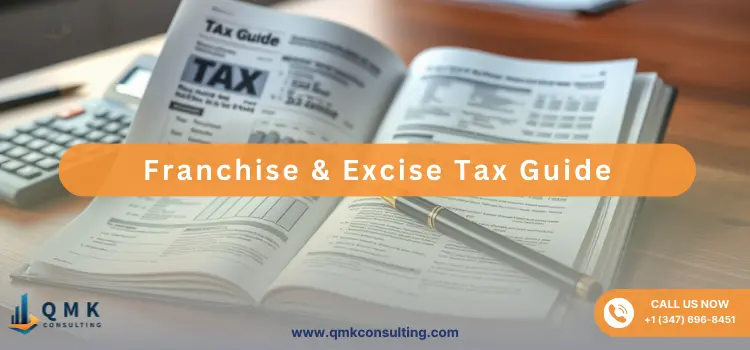
April 21, 2025 |Franchise Solutions


Taxes are rarely a topic that sparks joy at dinner parties. However, for businesspeople—particularly those in franchising and excise tax-impacted businesses—knowledge of these taxes is the path to long-term prosperity. At QMK Consulting, we try to demystify these technical topics into simple, everyday language. Along the journey of this guide, we'll explore the nuts and bolts of franchise and excise taxes, where they differ, and how they practically affect your business. We'll simplify and unravel the complexity of these important taxes.
Franchise taxes are taxes imposed on businesses for the privilege of doing business in a state. Contrary to the impression created by the term "franchise," however, these taxes are not necessarily imposed only on franchise businesses in the classical sense of the word. In most instances, there is a fee for the simple privilege of being a legal business in a state. The tax may be imposed on gross receipts, revenue, or even on the capital holdings that a business keeps.
Almost every business entity may be subject to a franchise tax depending on the state’s specific laws. Corporations, limited liability companies (LLCs), and even some partnerships might find themselves on the hook for this fee. It’s crucial for businesses to factor this cost into their operational budget, regardless of whether they’re a national chain or a local startup.
A point of confusion for many is the distinction between income taxes and franchise taxes. Whereas income taxes are assessed according to the profitability of a business, franchise taxes are usually assessed profit notwithstanding. Consider the following: you pay franchise tax for the privilege of having your company exist and operate, and income tax is assessed on the profit actually realized.
One of the problems with managing franchise taxes is that every state does the arithmetic in its own way. There are some with a flat rate, but some use gross receipts, revenue, or even capital. So if you're a company with operations in more than one state, you'll need to know about many different methods. Knowing the differences can protect you from cost surprises and allow you to plan your finances better.
Another way a company's bottom line may be greatly changed is via excise taxes. Unlike franchise taxes, excise taxes are product-specific or service-specific.
Usually, producers or manufacturers of the relevant goods pay excise taxes; in practice, consumers bear the majority of the load in terms of final product costs. Firms heavily dependent on subject commodities must monitor excise tax activity closely so that price movements do not erode their competitiveness.
Though both taxes may eventually impact a business, they serve different functions and are calculated differently. Franchise taxes are more like a fee for the privilege of conducting business, which is calculated based on things like revenue or capital. Excise taxes are levied on certain commodities or activities and are often determined depending on the quantity or monetary value of the product. It is necessary to understand the distinctions for strategic planning and compliance.
Excise and franchise taxes have the potential to greatly influence financial planning at your business. Franchise taxes are a fixed expense of doing business no matter your level of profit, and excise taxes potentially directly influence your pricing strategy by adding to your cost of goods sold. This two-tax approach leaves business owners in the position of being highly attuned to their tax burden and actively looking for methods to maximize their bottom line.
Franchise taxes are computed in a number of various ways, based on the state:
There are pros and cons to each approach. Companies need to examine their own financial situation to see which approach works best for them.
Excise taxes are usually calculated by the quantity or monetary value of the product. For instance:
It is important to get these calculations correct to be compliant and also not to overcharge your products, as this will scare off customers.
Working through the complexities of franchise and excise taxes can be tricky. Some pitfalls to watch out for include:
At QMK Consulting, we're professionals at guiding your business through the complicated network of franchise and excise taxes. Our New York City-based staff not only interprets these taxes for you but also ensures that your accounting is immaculate. Our expertise in restaurant accounting and franchise financial management is backed by years of real-world experience, so we're your best chance at handling F&E taxes.
We offer one-on-one consultations to review your current tax planning and to optimize your operations for better cash flow and profitability. Book a free profit and cash flow analysis with Mohamed Karmous, our seasoned restaurant accounting consultant and franchise expert, and let us assist you in optimizing the full potential of your business finances.
Prepared to see your financial situation more clearly? Book your free profit and cash flow analysis with Mohamed Karmous today. As experts in franchise and excise taxes, QMK Consulting is committed to elevating your business performance in New York City and beyond.